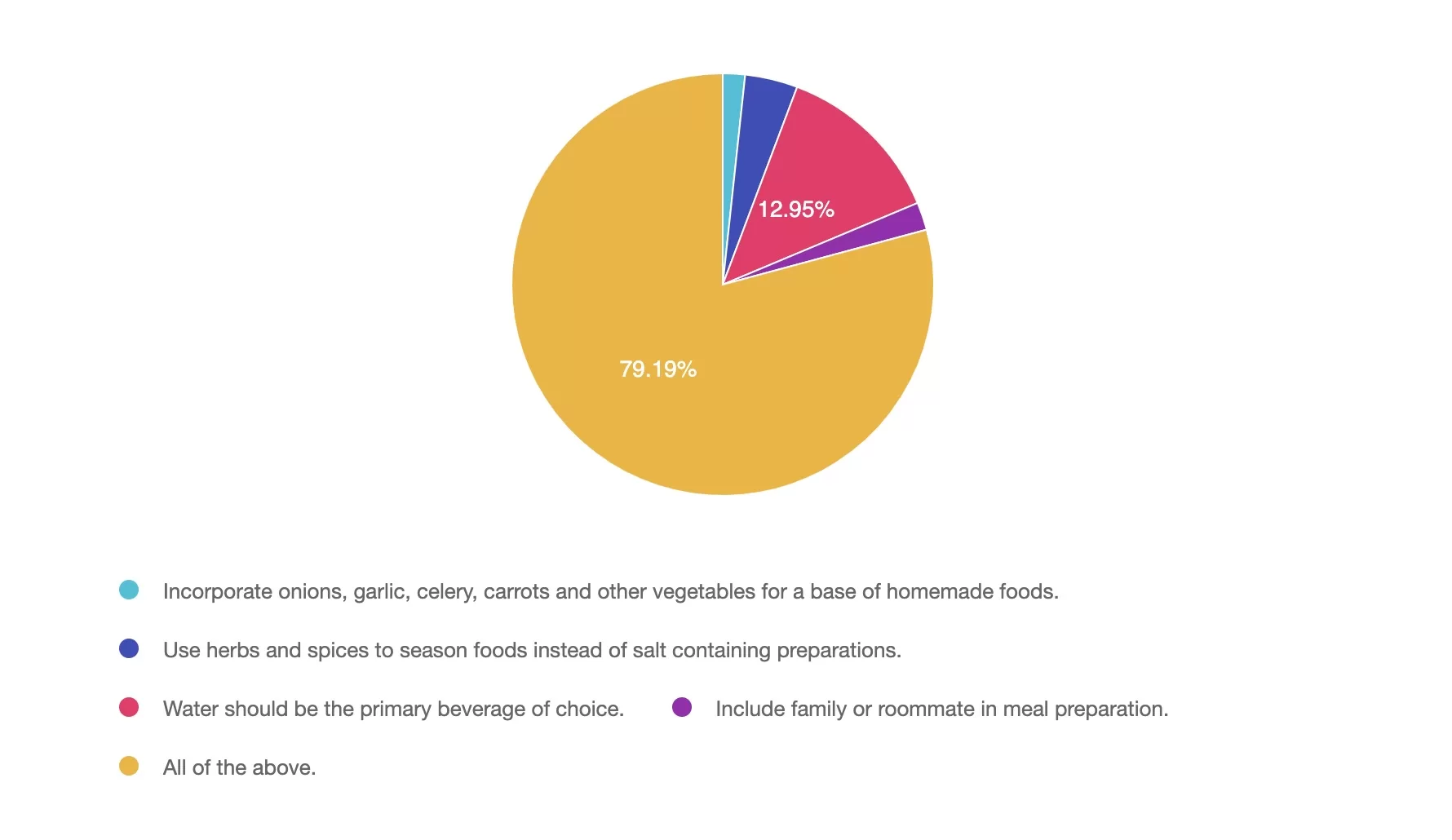For last week’s practice question, we quizzed participants on. 79% of respondents chose the best answer. We want to clarify and share this important information, so you can pass it on to people living with diabetes and your colleagues, plus prepare for exam success!
Before we start though, if you don’t want any spoilers and haven’t tried the question yet, you can answer it below: Answer Question.

Question:
According to the 2025 ADA Standards of Care, which of the following nutrition behaviors are strongly encouraged for individuals with diabetes?
Answer Choices:
- Incorporate onions, garlic, celery, carrots and other vegetables for a base of homemade
foods. - Use herbs and spices to season foods instead of salt containing preparations.
- Water should be the primary beverage of choice.
- Include family or roommate in meal preparation.
- All of the above

Getting to the Best Answer
Answer 1 is incorrect. 1.7% chose this answer, ” Incorporate onions, garlic, celery, carrots and other vegetables for a base of homemade foods.” Although this answer is true, it is not the best answer. Incorporate onions, garlic, celery, carrots, and other vegetables for a base of homemade foods. These foods can serve as a base to many dishes and incorporates flavor, fiber, vitamins, and minerals while encouraging vegetable consumption.
Answer 2 is incorrect. 4% of you chose this answer, “Use herbs and spices to season foods instead of salt containing preparations.” Although this answer is true, it is not the best answer. 90% of people in the US exceed the daily recommended limits for sodium. Reducing salt intake is important for heart health, managing blood pressure and meeting dietary guidelines. Herbs and spices not only enhance flavor and may provide additional health benefits.
Answer 3 is incorrect. About 12% of respondents chose this, “Water should be the primary beverage of choice.” Although this answer is true, it is not the best answer. The 2025 ADA Standards of Care have emphasized water as the primary beverage of choice. Alternatives to plain water can include no calorie alternatives. Suggestions to add lemon, lime or cucumber to water, choose sparkling no calorie beverages and no-calorie carbonated beverages are also encouraged.
Answer 4 is incorrect. 2% chose this answer, “Include family or roommate in meal preparation.” Although this answer is true, it is not the best answer. Engaging others in meal preparation can create a supportive environment, encourage healthier eating habits, and make cooking more enjoyable. Social support can be especially helpful in managing diabetes long-term.
Answer 5 is correct. 79% chose this answer, “All of the above.” The 2025 ADA Standards of Care encourages all the above nutrition behaviors.
We hope you appreciate this week’s rationale! Thank you so much for taking the time to answer our Question of the Week and participate in this fun learning activity!
Ignite your passion & prepare for Diabetes Certification!
Join our Expert Team at our dynamic Virtual DiabetesEd Training Conference April 16-18th, 2025

Gain fresh insights, practical tools, and a deeper understanding of the latest in person-centered diabetes care. Our expert team brings the ADA Standards of Care to life—covering medications, behavior change, technology, and more! If you’re preparing for the CDCES or BC-ADM exam, this conference—paired with free bonus courses—serves as the ideal study companion!
With interactive co-teaching, we keep sessions engaging, relevant, and fun. Let’s learn and grow together!

Our expert team transforms complex diabetes science into clear, practical insights—keeping it real, engaging, and fun! The faculty includes:
- Diana Isaacs, PharmD, BCPS, BC-ADM, BCACP, CDCES
- Coach Beverly Thomassian, RN, MPH, CDCES, BC-ADM
- Christine Craig, MS, RD, CDCES
- 3 Days: of critical information delivered by passionate speakers in an engaging and fun format!
- 11 Bonus Online Courses: As a course attendee, you automatically receive a bonus online course bundle of 11 online courses valued at over









